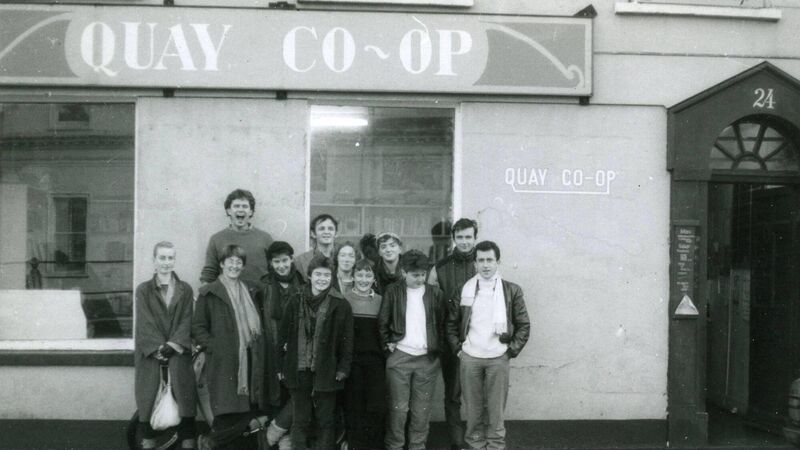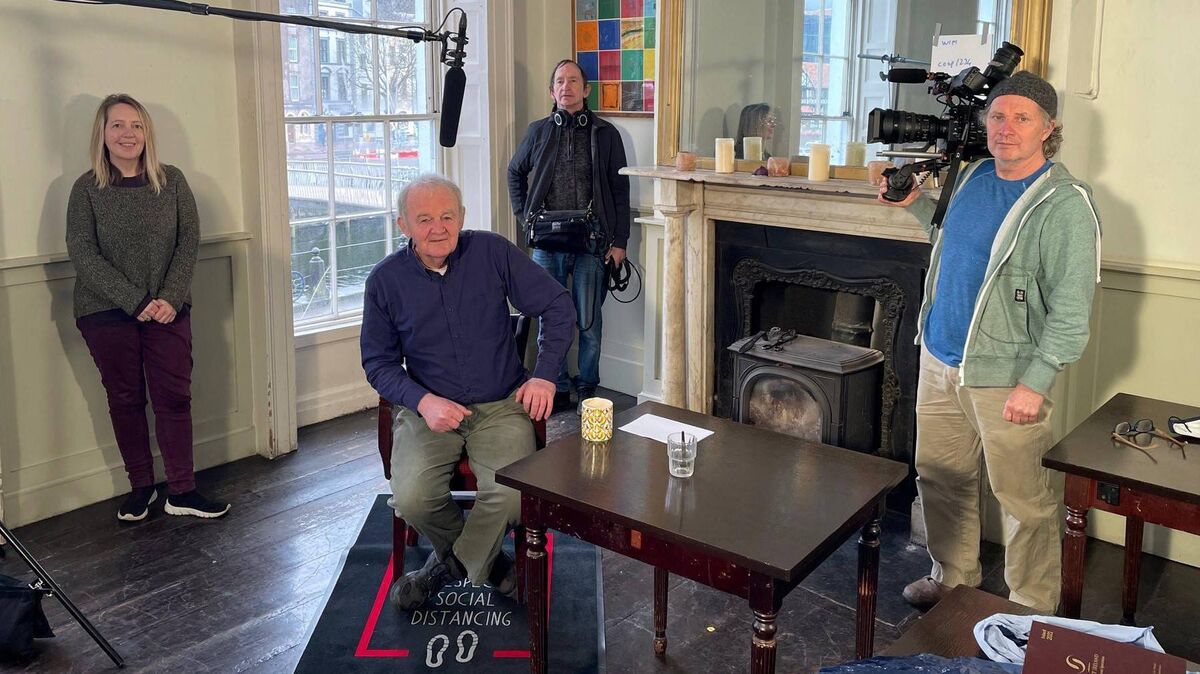Quay Co-op: How a Cork institution broke new ground in the 1980s

Arthur Leahy, back centre, and some of the other early members of the Quay Co-Op.
The Quay Co-op is a legendary institution whose essence goes far beyond its bricks-and-mortar incarnation as a shop, restaurant and café at Sullivan’s Quay in Cork. When it was founded in 1982, it was a beacon and often a life-raft for those struggling to stay afloat in an Ireland that was less than hospitable to anyone viewed as different.
The part it has played in Cork’s social history was something that documentary-maker Emma Bowell, who along with husband Eddie Noonan runs Frameworks Films, has wanted to honour for a long time and now the resulting documentary, The Quay Co-Op, is being screened at the IndieCork festival, currently under way in the city. The idea for the documentary was sparked back in 2005 when Bowell and Noonan made a series of short documentaries for Cork’s stint as European Capital of Culture.
“We were doing one called Out and About which was mapping the history of the gay community in Cork, and we heard some of the stories going back to the 1980s about what a radical place the Co-op was. We thought this story really deserves to be told in greater detail. It was always in the back of our minds to try and do something,” she says.
Bowell and Noonan decided to focus on three strands of the Co-op’s history for the documentary.
“One was the fact that it was such a centre for so many different social justice campaigns over the years, for people who wanted to see Ireland developing in a more progressive way. Then there is the whole idea that it is a co-operative and what does that actually mean — how does that work in practice. Finally, there is the whole vegetarian restaurant element, the politics of food, that side of it. They were such leaders in that field, now it is normal, but back then, as one contributor said, if you were vegetarian, you were looked at as if you came from outer space.”

Bowell says part of what made the Quay Co-op so special was the solidarity between the many groups involved, regardless of allegiance to a particular issue.
“People use all sorts of terms about it in the documentary, they call it a hub, a focal point, a safe space for anybody alternative. It wasn’t just about the gay and lesbian community, environmentalism, food or politics, it was the fact that there were so many different groups in there and they supported each other. If there was one group going out campaigning, people might not have had any interest in that particular issue, but by being in there and soaking up the atmosphere or having conversations in the café, that solidarity was there. I think that is what kept it going all these years through thick and thin.”
She says there are resonances for today, when there is less tolerance for working through dissent and disagreement.
“Some of the contributors talk about how it wasn’t all sweetness and light, there were a lot of rows and discussions. But they tried as much as possible to come to some kind of consensus and move forward with things. One contributor spoke about having a tense disagreement with someone and afterwards having to go into the kitchen and peel the spuds side by side and learning from that. I think there are definitely lessons to be learnt there.”
The documentary features contributions from people involved in the Co-op’s journey, from IndieCork founder Mick Hannigan to Chernobyl fundraiser Adi Roche. While there were key figures in the Co-op’s survival, such as founding member Arthur Leahy, at its heart has been the collaboration that is essential in any co-operative movement.
“Arthur was very keen to emphasise that it is not about him, it is a co-operative and he very much believes in that. There is no doubt that he was a driving force but there were other people too. Some have stayed involved and others have moved on. That was the other thing, a lot of other things came out of the Quay Co-op as well, places like the Cork Rape Crisis Centre [now Cork Sexual Violence Centre] and various other organisations whose seeds were in the co-op,” says Bowell.
Making the documentary has been a hugely rewarding experience for Bowell and Noonan, whose work over the past 21 years also serves as a record of what has been achieved by community organisations in the city.
“Our philosophy in general with all of the projects we have done is that we keep everything, all of the unedited footage for the documentaries. It is so important, as part of the whole social history of the city. That is something we talk to a lot of groups about, people need to be preserving and safeguarding all of their archive material.”
- The Quay Co-op will be screened as part of the IndieCork festival, Gate Cinema, 11am, Sunday, Sept 26; gatecinemas.com; also available online via indiecork.com


